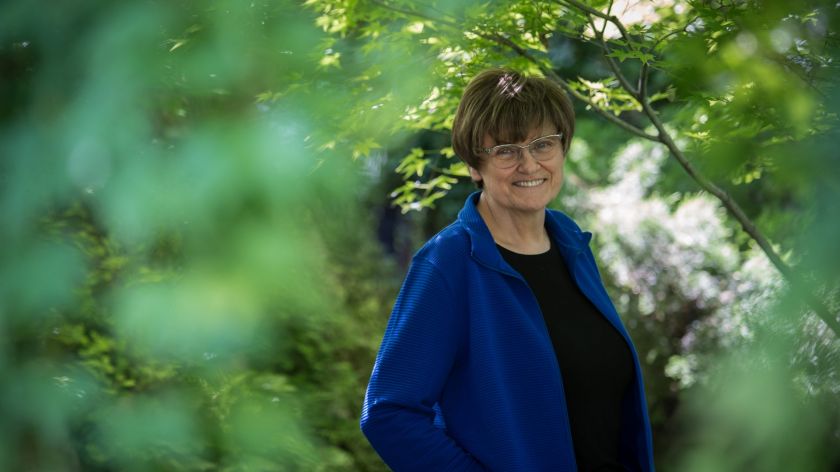Honorary Doctor Katalin Karikó Awarded Nobel Prize for mRNA Research
-
 Katalin Karikó. Photo: Csilla Cseke
Katalin Karikó. Photo: Csilla Cseke
Eminent researcher Katalin Karikó, an honorary doctor at Radboud University since 2022, will be awarded this year's Nobel Prize in Medicine, alongside Drew Weissman. Their discoveries were instrumental in the development of mRNA vaccines for COVID-19.
Every autumn, her mother used to say ‘Maybe you’ll win the Nobel Prize this year!’ Hungarian American biologist Katalin Karikó always laughed it off, she shared in an interview with Vox last year. But now, the prediction has indeed come true: Karikó (1955) will be receiving the Nobel Prize in Medicine.
She will share the prize (a medal, diploma, and 11 million Swedish kroner – almost 1 million euros) with her colleague Drew Weissman. Their work laid the foundation for the mRNA vaccines developed by Pfizer and Moderna, which played a crucial role in controlling the COVID-19 pandemic (see panel). These were the first approved vaccines for COVID-19 at the end of 2020.
Karikó’s unique contribution was discovering how to ensure that injected mRNA molecules in the body do not break down immediately before they can carry out their intended function. This discovery was essential for their use in vaccines. In 2021, The New York Times called her ‘one of the heroes’ behind the COVID-19 vaccines. She is affiliated with the University of Pennsylvania and Szeged (Hungary).
Teddy bear with 900 euros
Last year, Karikó received an honorary doctorate from Radboud University for her contribution to the development of mRNA vaccines. However, the doctorate was also in recognition of her unwavering determination. During the Cold War, she left communist Hungary for the United States with her husband and baby, with very little money. They smuggled 900 dollars inside a teddy bear.
As a scientist, she faced setbacks multiple times, being dismissed from her job on several occasions, but she continued to believe in her research. She told Vox earlier, “I knew I had to succeed in making mRNA that was clinically useful.”
Karikó was ‘one of the heroes’ behind the COVID-19 vaccines.
Karikó is likely to be the first to downplay the Nobel Prize’s significance. ‘It’s not about me,’ she said last year about the many other awards she received due to the success of mRNA vaccines. ‘All scientists build on what others have done; that’s how science works. Besides, there are so many good researchers who never receive an award. And in 100 years, no one will remember me.’
Revolutionary Vaccines
mRNA vaccines work in a fundamentally different way compared to traditional vaccines. Instead of injecting a viral particle or weakened virus (which then triggers a protective immune response), mRNA vaccines only contain the recipe for a viral particle, written in the computer language of our cells: the letters of an mRNA molecule. Our body then ‘bakes’ the viral particles as the recipe indicates, after which the immune system recognizes them as a foreign substance (similar to a regular vaccine) and produces antibodies.
This technique offers several advantages. Making an mRNA molecule is much easier and less labour-intensive than producing a viral particle. Therefore, they can be manufactured quicker and at a lower cost. mRNA vaccines are also more flexible; if a virus changes its shape (as with variants such as delta and omicron), you only need to modify the recipe, rather than produce completely new viral particles for the vaccine.
Revolutionary Vaccines
mRNA vaccines work in a fundamentally different way compared to traditional vaccines. Instead of injecting a viral particle or weakened virus (which then triggers a protective immune response), mRNA vaccines only contain the recipe for a viral particle, written in the computer language of our cells: the letters of an mRNA molecule. Our body then ‘bakes’ the viral particles as the recipe indicates, after which the immune system recognizes them as a foreign substance (similar to a regular vaccine) and produces antibodies.
This technique offers several advantages. Making an mRNA molecule is much easier and less labour-intensive than producing a viral particle. Therefore, they can be manufactured quicker and at a lower cost. mRNA vaccines are also more flexible; if a virus changes its shape (as with variants such as delta and omicron), you only need to modify the recipe, rather than produce completely new viral particles for the vaccine.
Translated by Siri Joustra



